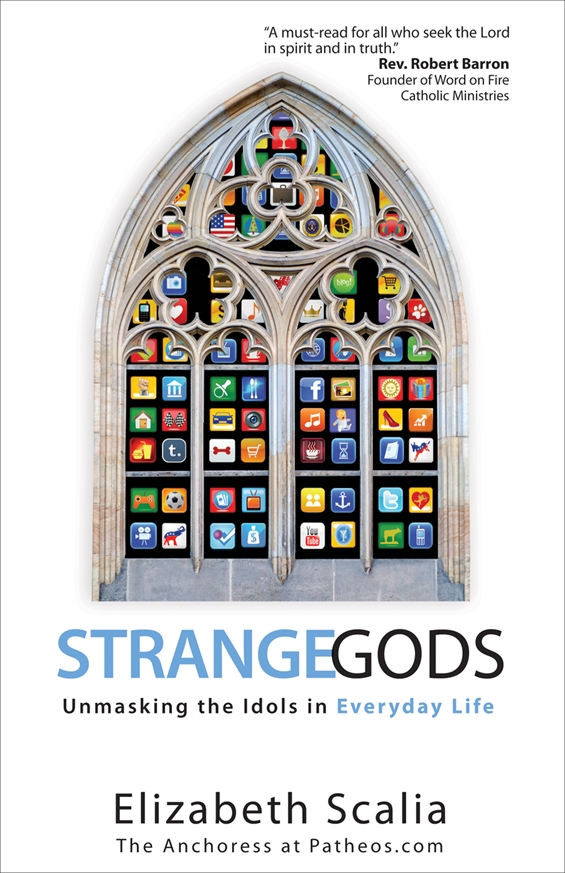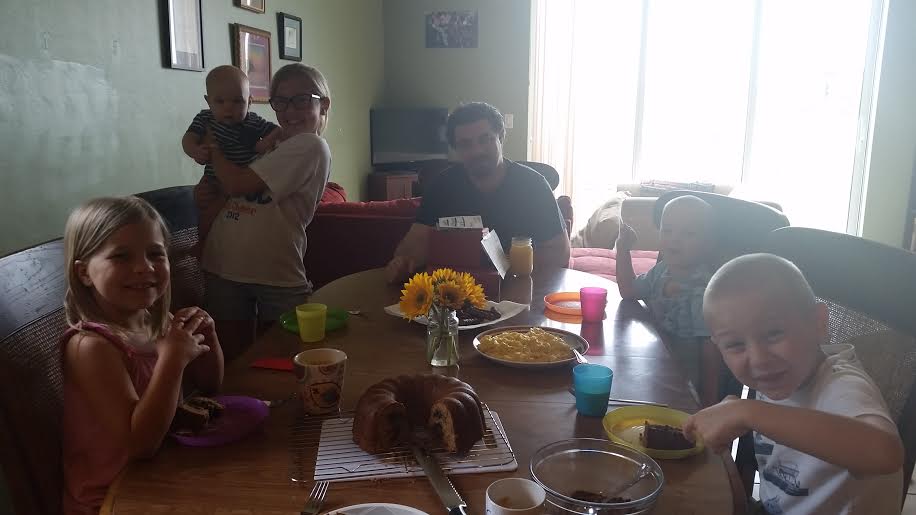Almost a year ago, I wrote my very first post at Patheos. The Anchoress brought me aboard, so I thought it only fitting to begin my sojourn here by relating how the Anchoress first became aware of my existence (via a “deeply offended” response to a light-hearted blog post) and how she responded with such a fearlessly charitable email. By “fearlessly charitable”, I mean that she told me the truth mercifully and with compassion, but without evasion.
That is something, isn’t it? It’s something that I hardly ever see these days. It’s something that I didn’t even recognize at first, that I had only seen in the writings of Raissa Maritain and Julian of Norwich. It’s something remarkable in this day and age. So it only follows that I was thenceforth suspicious that the Anchoress might be a secret liberal, and I kept tabs on her blog in equal measures of attraction to her kindness and distrust of her politics.
I was raised an Evangelical in Texas, y’all, and it took me a good while before I could hear Mark Shea’s name at all without dissolving into a puddle of indignant Republican wrath. I spent years thinking secession was not only a viable option but a master stroke of brilliance in the ultimate manifest destiny of Texas to DOMINATE THE UNIVERSE. It required all the cognitive dissonance to convert to Catholicism, and once I was there, I was poised to align myself firmly with whatever facsimile the papists had to offer me of “God, Guns and the GOP”. There were plenty there. I could choose from among them. And then the Anchoress sent me that email, and I started to see something new, and it scared the hell out of me.
It was only a week or two after her email that I even understood the concept of hell as something real, and sin as something I could reject, instead of something that had already (and irrevocably) ruined me. Ironically, that was precipitated by a conversation with friends who loved me dearly and whom I love dearly in return; it seemed like everywhere I turned, these papists were turning on me, saying awful things like, “it’s not your ideology but your actions that matter!”
I reacted first with denial, then anger, then bargaining, then despair. The stages of grief are supposed to end in “depression and acceptance”, but I just gave up and settled on “I’m totally f*cked”, because the rest seemed like too much work. Around this time, life conspired to shipwreck me half a country away from my husband, parenting three kids on my own, and I spent a solid six months writing about how miserable I was and how much everything sucked.
I even got sick of myself after that, something that I didn’t know was possible before. I started finding myself drawn more and more toward Patheos, the new home of my long-time Goddess of Uncomfortably Sympathetic Liberalism, the Anchoress. There was a lot of mercy going on there, and a whole lot of love, and oddly enough, it wasn’t white-washed with sentimentality. I liked what I saw there, and I didn’t like it, and yet I wanted it while I was repelled by it, and I, and I, and I I I I I I I I
I
Elizabeth Scalia likes to be called Lizzie. She told me so, and so I call her that, and it’s weird for me to call her “Elizabeth Scalia” now since I think of her in my head as “Lizzie/Boss/my Anchoress.” Her actual name is weirdly abstract to me. She’s Lizzie when I talk to her, but always the Anchoress in my head, because she’s been such an anchor in my life and because she is, in a very real way, the Anchoress of the Catholic bloggers at Patheos.
She has anchored me (and, I think, all the Catholic Patheosi) to mercy in a way that no one else ever has, by showing me that mercy doesn’t mean tolerance or diversity or any of our contemporary social virtues (as she so aptly terms them in her book); it means love, and love doesn’t mean what we think it means. It doesn’t mean “God, Guns and the GOP,” it doesn’t mean “gay pride” or “pro-life 4EVER” or any other ideology. To love at all requires loving Christ first, and loving Christ requires tearing down all the idols we put up in front of him.
Reading Strange Gods has been an eerie experience for me. There have been times when I have laughed out loud and sent her furious facebook messages about how funny she is, and times when I have sat in a darkened room, rocking the baby at my breast, crying bitter tears for my inability to exorcise the idol of myself from my life, from my children’s lives, from my marriage, from my family. It isn’t just the idol of myself; it’s the idol of everything me. My blog, my bills, my need to clean or failure to clean the bathroom, my laundry, my weight, losing my weight, my exercise, my food, not eating my food, my chocolate, not eating my chocolate, my glass of wine and how I refuse to ever not drink my glass of wine no matter what my weight is because wine is Almost God and giving up God would be bad (my Belloc said that, right? or pretty much that?), my kids, my baby, my Doctor Who, how much I love snow, how much I hate Florida, how much Florida has ruined my hair, how much my hair sucks, how ugly I am now, how pretty I used to be then, before my kids came along, but how much I love my kids, even this one who insists on being rocked endlessly at my breast, because after all, he’s mine. From the serious to the mundane, I can make an idol out of anything that I can make mine, which is everything. We all can.
What was I saying? Oh yes. The book. In the book, in the second chapter which she titled “God after Us: The Idol of I”, the Anchoress relates a bit of wisdom she received once from a nun, regarding distraction in prayer.
” ‘To pray is to love,’ she said, ‘and that is the easiest and most difficult thing to do. When you are distracted in prayer, imagine a mother gently putting her finger under the chin of a distracted child and simply guiding its attention back to where it belongs: no guilt and no remonstrance. You just go on’.”
This was my experience in reading the Anchoress’s book. She would say something true, something that hit me hard, something like,
“I asked her if she realizes that in saying ‘See what the world has been up to’ she means that the big world — the fascinating world — was the one coming to her through a 19-inch-monitor, which was able to draw her attention more completely than a human being standing right before her.” (Strange Gods, page 66)
and I would lock myself in my closet and sob about what a wretched mother I am, for ignoring my children who are always (and for real, I mean always) standing right before me, begging for the attention I’m instead devoting to Facebook and comment moderation.
And then Liam would punch Charlotte in the head or vice versa, rudely forcing me out of lamenting how much I ignore them. When I had settled the kids and, forgetting that I had been feeling sorry for myself for being awful instead of reading, picked the book up again, Lizzie would put her finger under my chin and say,
“O, irony! What do you think has inspired this chapter but my own realization that I have put the very strange god of Internet infotainment before God Almightly — and too often before my God-given family or commitments? I have succumbed to the distracting, destructive power of seeing my own ideas and words erected somewhere, all spruced up and reflecting me back at myself.” (Strange Gods, page 67)
She comes back to that image again and again. The image of ourselves, being reflected back to us in a million different forms, a million different shapes, all worthy of our worship because after all, “We are, by far, our favorite and most fascinating subjects” (p. 28). In a million different ways, we ourselves are the gods we place before God. Whether that is the idol of the idea, the idol of prosperity, the idol of technology, the idols of coolness and sex, the idol of plans, the super idols of ideology, or the terrifying meta-idol of trying to root out our idols, it all comes down to the almighty I. We reflect ourselves and love it, instead of reflecting and loving God. And by “we”, of course I mean “I”. I read my own blog posts twice as often as I read anyone else’s. Most of the time, I get to the end and think, “wow, I really am clever. Well done, me. You should write more often.” And then I buy myself a drink and giggle with myself about how funny that one line was.
There is only one solution to the terrible tyranny of the almighty I, of course.
“Beyond the idols we create with our egos and ideas, there is an alternative un-earthly universe where we may encounter the deep and constant reality of God. No wonder it scares off so many. In our age the self is everything to be celebrated and never to be diminished. Church subsumes; liturgy subsumes; community subsumes; and when we are subsumed, all of the idols disappear; we become not lone worker bees, but the very buzz of the hive.
And what sweetness is found therein.”
(Strange Gods, p 154)
I’m given to summing up posts with some bit of insight, to try and tie them up neatly, and usually hit “publish” quite satisfied with my own cleverness. Given that the Anchoress has just shown me the idol I have made of “Calah, clever blogger,” I’ll end this post with the words of someone infinitely wiser than I, another anchoress in her own right. This is from Emily Dickenson’s poem, “We Grow Accustomed To the Dark.”
The Bravest — grope a little —And sometimes hit a Tree
Directly in the Forehead —
But as they learn to see —
Either the Darkness alters —
Or something in the sight
Adjusts itself to Midnight —
And Life steps almost straight.
You can buy Strange Gods in paperback or for your Kindle here at Amazon, and you can read other reviews of Elizabeth’s book here at the Patheos Book Club.















